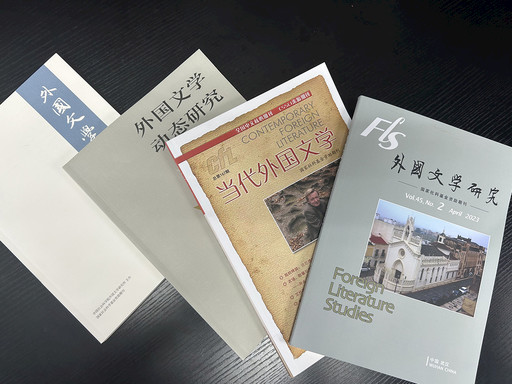
. > WHAT'S NEW > TOPLINE
Seminar eyes Chinese narratives in American literature
Author : WU NAN and LIU XIAOJIAO Source : Chinese Social Sciences Today 2023-08-18

Journals of foreign literature studies Photo: Yang Lanlan/CSST
SHIHEZI—A literary seminar was co-hosted by the branch of China-US comparative cultural studies at Chinese Comparative Literature Association (CCLA) and the School of Foreign Languages at Shihezi University, Xinjiang, on July 22.
Chinese narratives
In the new century, the world has experienced significant transformations, and China has emerged as a prominent player in global economic, social, and cultural progress. Consequently, studies of American literature in China has witnessed continuous growth, evolving from initial brief overviews to thematic and progressive research. While scholars continue to explore the works of renowned authors like Walt Whitman, Ernest Hemingway, and William Faulkner, there has been a shift in focus towards ethnic American literature, female literature, and postmodern literature. Within the realm of ethnic literature, African, Jewish, and Chinese literature have garnered the most attention.
As the product of China-US cultural exchanges, Chinese American literature displays distinctive characteristics. Most Chinese American writers possess dual cultural identities and perspectives. Drawing from their unique life experiences, they explore and articulate the survival of the Chinese American community in the collision of bilateral cultures, delving into themes of destiny and personal life choices. The incorporation of “Chinese narratives” within Chinese American literature represents a unique form of literary expressions.
According to Cheng Aimin, head of the branch of China-US comparative cultural studies at CCLA, Chinese American writers represented by Maxine Hong Kingston and Amy Tan borrow and adapt certain unique narrative forms of Chinese literary traditions in their own creations. They give legitimacy to the narrative strategies and cultural sources of Chinese American literature, and highlight the important historical role of Chinese Americans in local society, thereby empowering their own writings.
Cheng argues that domestic and foreign studies on Chinese American literature tend to overly focus on culture and identity, neglecting the literary aspects of texts. Chinese American literature is not solely a product of a particular ethnic group, but also an integral part of the broader literary landscape. Scholars should not only proceed from the perspective of writer identity or Chinese literature, but also further investigate textual literariness through literary representations.
“We need to rediscover both Chinese and non-Chinese writers, such as the literary perceptions of American writer Peter Hessler (Chinese name He Wei) on contemporary China,” said Yang Jincai, a professor from the School of Foreign Studies at Nanjing University. These works help examine contemporary Chinese writing and its cultural representation in American literature. They also contribute to enhancing the American people’s comprehension of present-day China, addressing both accurate understandings and potential misconceptions. This field extends beyond being a mere academic examination of foreign literature, as it offers valuable insights for the formulation of improved foreign exchange policies. This enables a clearer and more comprehensive picture of American culture and the mindset of local people.
China stances needed
In September 2015, Chinese President Xi Jinping elaborated on the concept of a human community with a shared future on the stage of the United Nations. The concept not only has rich and profound political and cultural connotations, but also reflects a deep sense of humanistic concern. Maintaining world cultural diversity, encouraging mutual learning among civilizations, respecting each country’s development path, and upholding peaceful coexistence are embodied in the core vision of the concept.
In this context, more efforts are required to review cross-cultural, cross-border, cross-ethnic, and transnational immigrant writers in American literature, and cultivate a sense of presence in American social realities, Yang added. We need to avoid becoming a mere “mouthpiece” of American academic discourse or a passive “transmission broadcaster” of American ideas and values.
“There is a greater call for highlighting the Chinese perspective and Chinese stance in the study of foreign literature,” said Su Hui, a professor from the School of Chinese Language and Literature at Central China Normal University. In a sense, contemporary British and American ethical criticism and anti-ethical criticism can be seen as a continuation and evolution of moral absolutism and aestheticism. These two opposing theories represent the inherent contradiction between the heteronomy and autonomy of literature and art.
Ethical literary criticism constructed by Chinese scholars have clarified the relationship between ethics and aesthetics, Su continued. They argue that literature’s purpose and function, from its inception, is not solely for aesthetics, but also for moral instruction. They differentiate ethical literacy criticism from moral criticism by highlighting their fundamental distinctions. Moral criticism evaluates writers and their works based on prevailing moral concepts and standards, while ethical literary criticism tends to analyze, understand, and interpret various moral phenomena in literature within their objective historical contexts.
He Chengzhou, dean of the School of Arts at Nanjing University, emphasized the influence of performativity theory on the construction of literary theory by explaining its connotation and historical evolution. He explored whether literary research should extend beyond character analysis and how readers can identify with characters, while proposing a shift in focus towards the reading process itself and the active engagement of readers. He further recommended elucidating the relationship between literature and ethics, politics, and life, with the aim of establishing a new paradigm of literary research in this process.
Ye Shengtao made Chinese fairy tales from a wilderness
Ye Shengtao (1894–1988) created the first collection of fairy tales in the history of Chinese children’s literature...
-
How northern ethnicities integrated into Chinese nation
2023-09-18
-
Mogao caves
2023-09-12
-
Mogao Grottoes as ‘a place of pilgrimage’
2023-09-12
-
Time-honored architectural traditions in China
2023-08-29
-
Disentangling the civilizational evolution of China
2023-08-28
-
AI ethics in science fiction
2023-08-23













 2011-2013 by www.cssn.cn. All Rights Reserved
2011-2013 by www.cssn.cn. All Rights Reserved